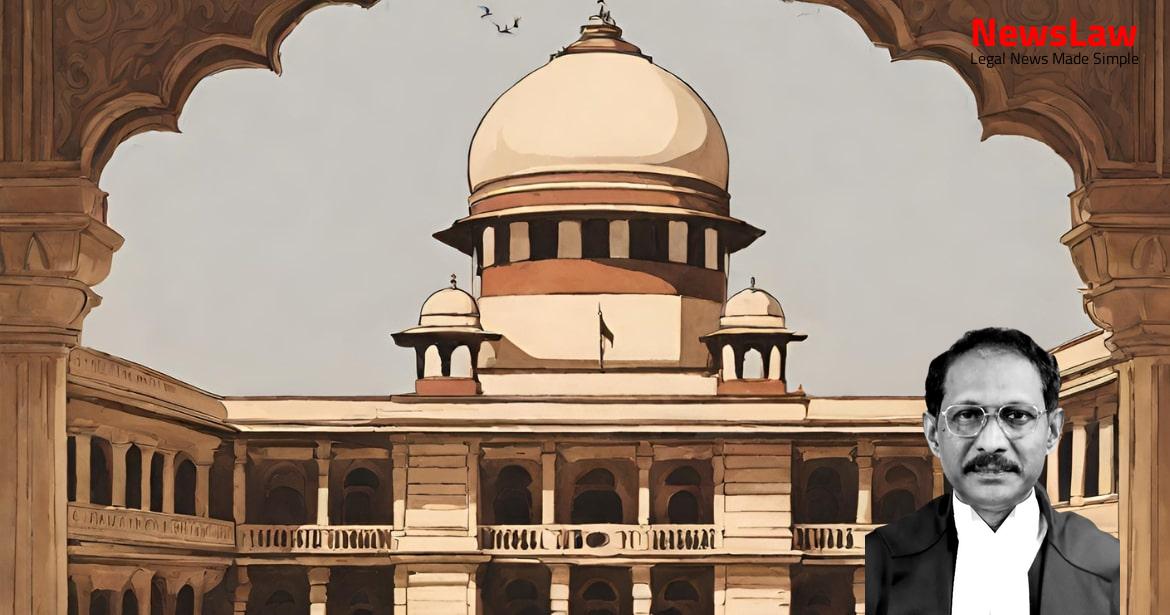Explore the Supreme Court of India’s decision in the case related to the denial of exemption for personal cultivation on private forest land vested in the State Government. The judgment sheds light on the complexities of land ownership and forest conservation, impacting various stakeholders involved in the dispute.
Facts
- Appellants filed Civil Appeals challenging the Judgment of the High Court.
- The land in question was private forest land that vested in the State Government in 1971.
- Appellants claimed exemption under Section 3(2) of the Act for personal cultivation but were denied due to lack of evidence.
- Commissioner’s reports indicated the land was mainly planted with acacia trees.
- High Court held Appellants were only entitled to exemption for 7.85 acres out of 79 acres and 68.5 cents claimed.
- Appellants purchased 100 acres of land, 80 acres vested in the State.
- Appellants also contended that the land falls in Malabar District, but possession was only active in 7.85 acres.
- Appellants possessed 20 acres and 31.5 cents of land according to Commissioner’s reports.
Also Read: Compassionate Appointment Case: Supreme Court’s Landmark Ruling
Analysis
- Section 2(f) of the Act defines a ‘private forest’ in two contexts: Malabar district and the rest of Kerala.
- In the Malabar district, private forest excludes certain types of lands, including those used for cultivation of specific crops and lands for ancillary purposes.
- In the rest of Kerala, private forest includes any forest not owned by the government, including waste lands within wooded areas.
- Private forests, as defined in the Act, are transferred to and vested in the government without encumbrances.
- Owners holding private forests for personal cultivation within the ceiling limit under the Kerala Land Reforms Act are exempt from the transfer to the government.
- Private forests held under valid titles before the appointed day, intended for cultivation, and within the ceiling area limit are also exempt.
- Private forests are considered ‘other dry lands’ for the purpose of calculating the ceiling limit under the Kerala Land Reforms Act.
- Waste lands, even with scattered trees or shrubs, are deemed as waste lands for the purpose of the Act.
- The Kerala Private Forest (Vesting and Assignment) Act, 1971 vests ownership and possession of private forests in the government, subject to certain provisions.
- Section 3 of the Act specifies that private forests in Kerala shall vest in the government from the appointed day.
- Courts below found no cultivation on the land in question on 10.05.1971.
- Possession taken over by State in 1975.
- Land in Malabar District is not private forest land as per Section 2(f) (1) of the Act.
- Lands principally under cultivation of certain crops are excluded from private forest land.
- Land in question vested in State more than 48 years ago, making sub-section (1) of Section 2(f) applicable.
- Private forest includes land to which Madras Preservation of Private Forest Act, 1949 applied prior to 10.05.1971.
- The Appellants did not provide any evidence of cultivation on the land in question.
- The land falls under the definition of ‘private forest’ as per the Act.
- As per the Act, all private forests in Kerala automatically vest in the State Government from 10.05.1971.
Also Read: Judgement on Auction of Assets in Hirakud Industrial Works Ltd. Case
Decision
- The Appellants are not entitled to the exemptions under sub-sections (2) and (3) of Section 3 of the Act.
- The Civil Appeals are dismissed.
- The exemption granted by the High Court under Section 3(3) with respect to 7.85 acres of land is affirmed.
- All pending Applications, if any, are accordingly disposed of.
Also Read: Land Dispute Resolution: A Supreme Court Judgement
Case Title: P. T. SREENARAYANAN UNNI Vs. STATE OF KERALA .
Case Number: C.A. No.-008168-008168 / 2010



